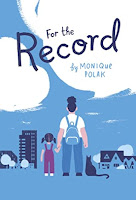March 15th 2022 by Owlkids Books
E ARC provided by Edelweiss Plus
Justine and her younger sister Bea are struggling with their parents' divorce, and with going back and forth between their mother and father's places. Neither situation is ideal; their father's apartment is disorganized and run down, and he doesn't adhere to their mother's rules. Their mother has struggled with some mental health issues, and seems very fragile. Sometimes she doesn't eat and is depressed, and she has very strict rules for the girls. Justine has started a notebook to keep track of when her father doesn't follow the recommendations for what the two eat, what activities they do, and whether or not they follow safety procedures like wearing seatbelts. They do like the stability of the mother's, and the fun of their father's. He has his daughter from another marriage, Marry, living with his sometimes, and Justine especially loves to be with her sister. When he adopts a cat from a shelter, the girls are glad to visit their father and Sheldon, their new one eyed cat. They are also interested in spending time with their French grandmother, who has come to live with their father. Things take an unfortunate when Sheldon gets out of the house and runs across the street, and Bea follows. She's just four, so while she knows the rules, doesn't always remember them. Her father grabs her roughly to stop her from going into the street. When Justine realizes what has happened, she thinks that if she reports about this in a bad way, her mother will be happier. Of course, this also means that their father will lose custody, but Justine seems unconcerned about that, although she loves her father. When she tells her mother, the girls are assigned their own lawyer, who walks them through their experience at their father's. Eventually, they are no longer allowed to visit him at home, but must have a supervised visit. When the process drags on, the mother decides to take a better job in a different city, knowing that this will speed up the proceedings. Justine realizes that she could be further estranged from her father, Marry, and her grandmother if her mother is allowed to take them. Will she be able to tell the judge the truth about her situation?
Strengths: There are a lot of books that deal with the grieving process when a parent dies, but oddly few dealing with how children deal with divorce. It can be very complicated, and moving between households can be stressful. I liked how there were some positive things, and that Justine had a good relationship with her sister Marry and grandmother. It was also interesting to see part of the legal process involving custody, from Justine's perspective. There was even a little bit of friend drama. An author's note at the back explains the phenomenon of Parental Alienation Syndrome, which explains why Justine was fighting for her mother even though she loved her father.
Weaknesses: It was a bit confusing to see Justine sabotage her father. I wish there had been more specific examples of her mother manipulating her, or that Justine had been shown thinking about what she was doing to her father and their relationship
What I really think: This was a bit more of an elementary school book because of the large amount of time spent with the parents. Middle school stories spend a lot more time with children distancing themselves of spending time on their own. Include this with other books involving children's experiences of divorce, including Payne's The Thing About Leftovers, Burt's The 12 Dares of Christa, Carr's 365 Days to Alaska, Murphy's Dear Sweet Pea, Mackler's Not if I Can Help It, Youngblood's Love Like Sky, Burke's An Occasionally Happy Family, and Draper's Blended. Interesting note: there seem to be a disproportionate number of books about divorce with girls as the main characters. Burke's title is the exception.
Weaknesses: It was a bit confusing to see Justine sabotage her father. I wish there had been more specific examples of her mother manipulating her, or that Justine had been shown thinking about what she was doing to her father and their relationship
What I really think: This was a bit more of an elementary school book because of the large amount of time spent with the parents. Middle school stories spend a lot more time with children distancing themselves of spending time on their own. Include this with other books involving children's experiences of divorce, including Payne's The Thing About Leftovers, Burt's The 12 Dares of Christa, Carr's 365 Days to Alaska, Murphy's Dear Sweet Pea, Mackler's Not if I Can Help It, Youngblood's Love Like Sky, Burke's An Occasionally Happy Family, and Draper's Blended. Interesting note: there seem to be a disproportionate number of books about divorce with girls as the main characters. Burke's title is the exception.



























No comments:
Post a Comment